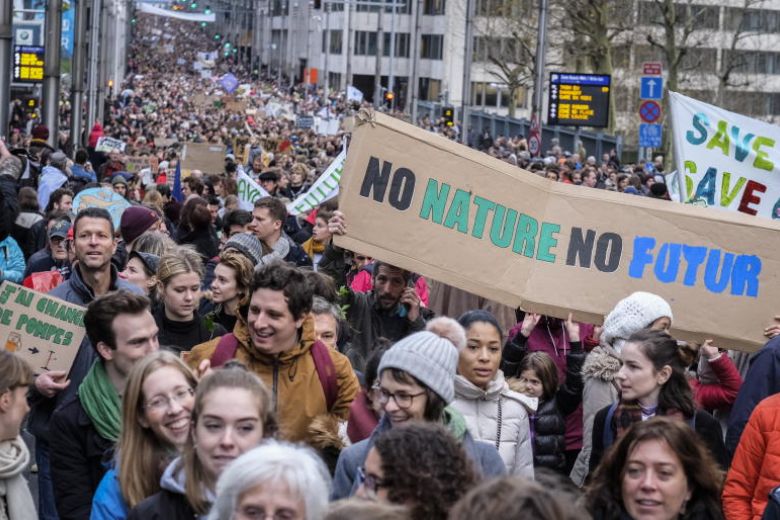Recent years have seen the rise of disparate social popular movements on both the right and left in Europe. Amidst these ever-evolving politics and increasingly heated demands for climate action, will European leaders’ climate plans be able to accommodate everybody’s needs?
Winter of 2018-2019 proved interesting for the green movement in Europe. In the run-up to elections all over the continent in May 2019 different groups mobilised, and the factions in our political theatre tabled plans for tackling climate change.
Far-right groups piggybacked onto social movements like Gilets Jaunes, aligning their messaging across an entire continent. The green movement, emblemized by 16-year-old Greta Thunberg's ‘Fridays for Future/School Strike For Climate’ offered a pleasant new way for millions of young people to look into the undeniably bleak abyss of global climate change.
Climate change and the right
The scene whereby the extreme right challenges for the throne has played itself out to different extents almost everywhere in Europe, and until now the only political solution for mainstream parties has been to tap into inherently nativist world views.
For many on the right, climate change will be as gradual as time is itself gradual, and the myth resides in how responsible we are for this change (hence the qualifier “Man-Made”), and that fortress Europe has all the resources it needs to build the dikes, and even green energy it needs for a fruitful pleasant future.
But the new right is not entirely aligned regarding women’s rights, LGBTQ issues, green issues, animal rights etc. It is a movement that is rife with contradictions and has no vision for the future that doesn’t involve tremendous violence and human suffering.
Despite this they offer a communal refuge to the politically disenfranchised, the right has captured something beyond our political imagination, turning its members into evangelists capable of forgiving one another in order to build a common cultural and political fantasy, a new ‘Europe’. Only once we know who “we” are can we begin to protect “ourselves”, they say.
Environmentalism
The green movement is a fit-to-purpose rhetorical mechanism that can be leveraged for political gain by any political ideology across any spectrum. Nowhere was that clearer than in the figurative arms race to attract ‘green’ voters that occurred in early 2019.
Green parties across Europe piggybacked onto the popularity of the well-crafted School Strike For Climate, a movement that is equal parts conspicuously viral and above reproach (a speciality of urban elite culture crafting).
In December 2018, Nobel prize-winning economist Thomas Piketty published a manifesto for the democratisation of Europe (TDEM). Piketty’s plan aimed to invest close to 2% of EU GDP into the green transition, close to €400 billion per year. A path to a nice green future was laid before our feet, designed by experts and fuelled by the positive energy of Europe’s striking youth.
Three days later, Yannis Varoufakis responded to Piketty’s manifesto. First comparing Piketty’s 2018 manifesto to his previous 2014 manifesto, Varoufakis pointed out a dramatic scaling back in its ‘European’ ambitions, and then highlighting that his movement the Democracy in Europe 2025 (DiEM25), not to be confused with Picketty’s group TDEM, itself suggests €500 billion per year to be financed via the ECB’s purchasing of green bonds issued by the European Investment Bank.
The green movement as represented by the School Strike For Climate remains singularly focused on their goal of reducing human impact on climate, and in doing so has detached itself from the complex and frankly unattractive mechanisms of power.
Thunberg’s most compelling speeches have come at the podia of the UN, the British Parliament, and the US congress, where she has pleaded with politicians to do ‘something’, as though any of these institution had any real power to enact such change.
In doing so the Political imagination of the green movement has become one that demands an outcome but is less drawn on how we reach it, thereby weaponizing itself to the ostensibly highest political bidder.
Europe's reaction
On 21 February 2019, EU commission president Jean-Claude Juncker pledged one trillion euros in the next EU budget, in a speech delivered in Brussels whilst standing next to Thunberg.
His successor to be, German defence minister Ursula Von Der Leyen has doubled down, announcing 1.1 trillion euros to this budget. While this number sounds big, it represents less than a third of what was proposed by the TDEM or DiEM25.
This comes in the midst of an EU struggling to square the circle of a post-Brexit EU budget where some are calling for an EU green budget.
What next for Europe?
Observers are saying that the Commission’s Green Deal will be the hallmark of this administration. The unenvious task of coming up with a plan to reduce carbon emissions by 55% by 2030 and be carbon neutral by 2050, this being the metric chosen by Europe’s political class to measure climate change, has fallen to Frans Timmerman who will have until the 12 December EU summit to devise a plan that must be unanimously adopted.
Nested in this plan is a bizarre new component that has only appeared recently. The EU Green Deal will contain a Just Transition Fund, aimed at helping European member states whose economies are coal-dependent.
This comes on the heels of Von Der Leyen’s first scandal, namely putting her support behind the notion of a ‘European way of life’, re-affirming the new political landscape in Europe where Nationalism with its nativist subsidiarity exist on one end of the spectrum and Neoliberal economics with its ‘ever closer union’ masquerading as a Green Deal reside on the other.
Passionate Europeanists like myself lament that on 1 November Ursula Von Der Leyen will ascend and Europe is likely to carry out the doomed strategy of neoliberal greenification with right-wing, nativist characteristics.
Alexandre D'Hoore


